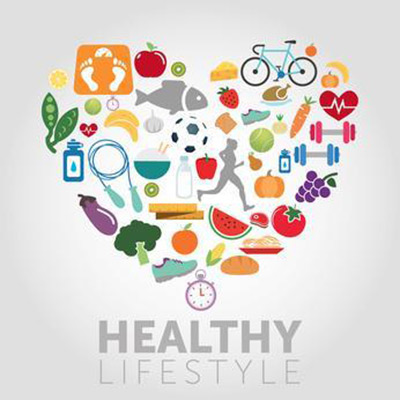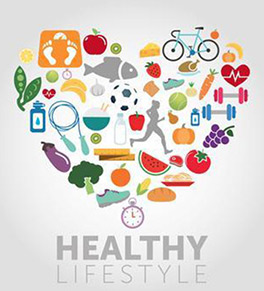
Do you know how your diet and lifestyle can help you to take care of your heart???
Are you struggling with high cholesterol? Cholesterol affects your heart and health. Learn what you can do to eat your way to a healthy heart.
What is cholesterol?
Our body produces cholesterol, a fat-like waxy substance that is used to make things like hormones, cells and Vitamin D. Cholesterol is found in cell walls throughout our body and travel through the blood in little packages called lipoproteins. There are two kinds of lipoproteins, LDL or low density lipoprotein “bad” cholesterol and HDL or high density lipoprotein “good” cholesterol.
LDL cholesterol in elevated levels in the blood sticks to artery walls and hardens into plaque. Plaque narrows the arteries, making them less flexible and blood can not flow easily. If the blood vessels in the heart known as the coronary arteries are affected, Coronary Artery Disease (CAD) may result.
CAD can trigger heart failure, heart attacks and strokes as well as other medical complications.
Lowering LDL cholesterol can help and may even reverse plaque buildup in the arteries. Although there are certain genetic factors you can not control that raise cholesterol, you can take some action in helping to lower your cholesterol levels.
Triglycerides are a type of fat found in the blood found in some foods that work with the LDL cholesterol to damage the arteries that leads to heart disease.
What can you do to protect your heart? Simple lifestyle changes can help you keep your heart healthy.
- Diet: Decreasing the amount of saturated fat and cholesterol in the foods we eat can improve your cholesterol numbers.
- Following a low fat diet including vegetables and fruit can help to lower your total cholesterol and LDL (bad cholesterol) levels.
- Limit your carbohydrate intake. Choose whole grains with 3g or more of fiber per serving.
- Avoid saturated fats- these are fats found mostly in animal products such as: poultry with skin, fatty beef/lamb/pork, whole milk dairy products like whole milk/butter/cheese/yogurt as well as coconut and palm oils.
- Avoid trans fats- fats that are found in many processed packaged baked goods made with hydrogenated oil such as: cookies, chips and crackers as well as fried foods.
- Consume lean meats/poultry without skin, fish and low fat dairy products.
- Include unsaturated fats (monounsaturated and polyunsaturated) in your diet such as: olive oil, canola oil, fish, avocados, walnuts or flax.
- Replace whole milk and whole milk products with low fat 1% milk or soy or almond milk varieties.
- Prepare lean poultry, meats and fish by baking, broiling, grilling or roasting instead of frying or sautéing.
- Portion Control! Use those measuring cups and food scale to keep your portions accurate. Too much of even a “healthy” food can add up your calorie intake.
2. Exercise:
- Physical activity can promote weight loss, boost your mood, can increase your HDL cholesterol and lower your LDL cholesterol. Achieving and maintaining a healthy weight can help to keep your heart healthy.
- Find a type of exercise that you enjoy! You do not have to join a gym in order to get physically fit. Go for a walk, play a sport you like, go swimming or dance! Start slow to avoid injury and gradually increase your duration of activity. Sometimes a work-out buddy can help to motivate you to stay on plan. Aim for at least 4 days of 30-45 minutes or more of exercise per week.
3. Managing Stress Levels:
- Finding ways to deal with our daily life stressors can help to reduce stress. Stress plays a large factor on heart health.
- Exercise, yoga, meditation, deep breathing exercises, massage or warm baths may help to reduce your stress level.
4. Smoking:
- Smoking Cessation! Smoking may lower HDL “good” cholesterol levels.
What Do The Numbers Mean?
Discuss your heart health with your Primary Care Physician (PCP) or cardiologist. A blood test known as a lipoprotein profile or Lipid panel/profile will measure your total, HDL, LDL cholesterol and triglycerides in your blood. Review the results of this blood test with your physician to determine what your best treatment option may be including lifestyle changes including diet/exercise and in addition may require medications.
Total Cholesterol:
Desirable Levels: Less than 200mg/dl
Borderline High: 200-239 mg/dl
High: 240 mg/dl or above
LDL Cholesterol:
Optimal: Less than 100 mg/dl
Near optimal/above optimal: 100-129 mg/dl
Borderline High: 130-159 mg/dl
High: 160-189 mg/dl
Very High: 190 mg/dl or more
HDL Cholesterol:
Provides you with some protection against heart disease: 60mg/dl or more
Major heart disease risk factor: Less than 40mg/dl
Triglycerides:
Normal: Less than 150 mg/dl
Borderline High:150-199mg/dl
High:200-499mg/dl
Very High:500mg/dl or more

